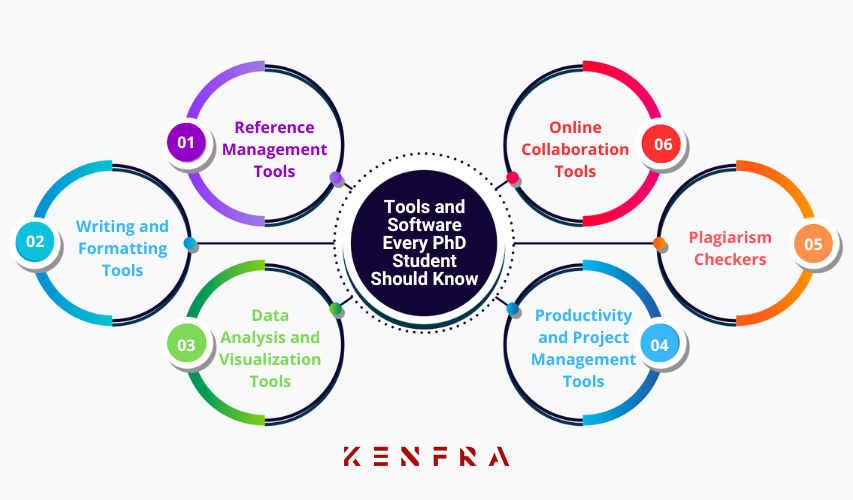Tools and Software Every PhD Student Should Know
Kenfra Research - Shallo2024-11-28T17:21:48+05:30Embarking on a PhD journey is both rewarding and challenging with mountains of data to analyze, papers to write, and references to manage, having the right tools can make all the difference. In this blog, we explore essential Tools and Software Every PhD Student Should Know to streamline their research and boost productivity, highlighting the importance of the right Tools and Software Every PhD Student Should Know for success.

1. Reference Management Tools
Efficiently managing references and citations is crucial for any researcher. These tools ensure your bibliography is accurate and saves hours of manual formatting.
Zotero
Zotero is a free, open-source tool designed for managing and sharing research materials. Its browser integration allows you to save references directly from websites, and it supports multiple citation styles, making it perfect for thesis writing.
EndNote
EndNote offers advanced features for reference management and is widely used in academia. Its integration with Microsoft Word simplifies in-text citations and bibliography creation, while its robust library organization keeps your sources well-managed.
Mendeley
Mendeley is more than a reference manager; it’s also a social network for researchers. It allows you to organize references, annotate PDFs, and collaborate with peers, making it a comprehensive tool for academic networking and research organization.
2. Writing and Formatting Tools
Clear and well-structured writing is vital for academic success. These tools help you create professional documents and adhere to strict formatting guidelines.
LaTeX
LaTeX is a document preparation system widely used for scientific papers and theses. Its powerful typesetting capabilities handle complex equations, bibliographies, and formatting effortlessly. While it has a learning curve, the results are unparalleled in precision and aesthetics.
Grammarly
Grammarly ensures your writing is clear, error-free, and impactful. With its advanced grammar and style suggestions, it’s an indispensable tool for polishing drafts, journal submissions, and emails.
Overleaf
Overleaf is an online LaTeX editor that facilitates collaboration and simplifies the writing process. It’s especially useful for group projects or co-authored papers.
3. Data Analysis and Visualization Tools
R is a powerful statistical programming language, and RStudio is its integrated development environment (IDE). Together, they offer unparalleled capabilities for data analysis, visualization, and reproducibility in research.
Python
Python is a versatile programming language with extensive libraries like NumPy, pandas, and Matplotlib, making it ideal for data manipulation, statistical analysis, and machine learning.
Tableau
Tableau helps researchers create interactive and visually appealing data visualizations. It’s user-friendly and perfect for presenting research findings in conferences and publications.
4. Productivity and Project Management Tools
Staying organized and on track is essential during a PhD. These tools help manage tasks, deadlines, and collaborations efficiently.
Trello
Trello’s intuitive boards, lists, and cards are perfect for tracking progress and managing tasks. It’s great for breaking down research projects into manageable steps.
Notion
Notion combines note-taking, task management, and collaboration in one platform. Its flexibility makes it ideal for organizing research notes, meeting agendas, and timelines.
Google Workspace
Google Workspace’s suite of tools (Docs, Sheets, Drive) is invaluable for collaboration and cloud storage. It ensures your work is accessible from anywhere, anytime.
5. Plagiarism Checkers
Ensuring originality in your work is non-negotiable in academia. Plagiarism checkers help you maintain ethical standards and avoid accidental overlaps.
Turnitin
Turnitin is a widely used tool for plagiarism detection. It provides detailed reports highlighting matched content, ensuring your work is original.
Grammarly Premium
In addition to grammar checks, Grammarly Premium includes a plagiarism detection feature, making it a dual-purpose tool for academic writing.
6. Online Collaboration Tools
Collaborating with peers and supervisors is an integral part of the PhD journey. These tools make collaboration seamless.
Slack
Slack is a popular communication platform for academic groups. Its channels, direct messaging, and file-sharing capabilities keep everyone connected.
Zoom
Zoom facilitates virtual meetings and webinars, making it essential for remote collaborations, thesis defenses, and conference presentations.
Conclusion
The right Tools and Software Every PhD Student Should Know can significantly enhance your productivity, simplify complex tasks, and ensure the quality of your work. Whether you’re managing references with Zotero, writing your thesis in LaTeX, or analyzing data with Python, these tools are indispensable for every PhD student. Explore them, master their features, and watch your academic journey become more efficient and rewarding.
Need more support on your PhD journey? Kenfra Research is here to guide you through every step, from topic selection to final thesis submission!
Which of these Tools and Software Every PhD Student Should Know do you already use? Share your favorites or recommend others in the comments below!









Comment (1)
An incredibly useful and well-structured guide! These tools are a game-changer for any PhD student striving for efficiency and excellence in research. Thanks for sharing such valuable insights!